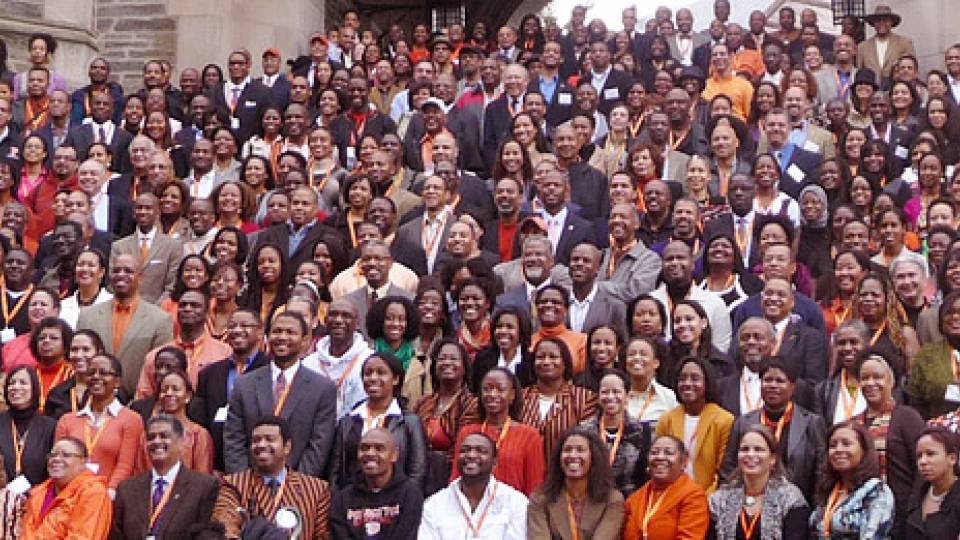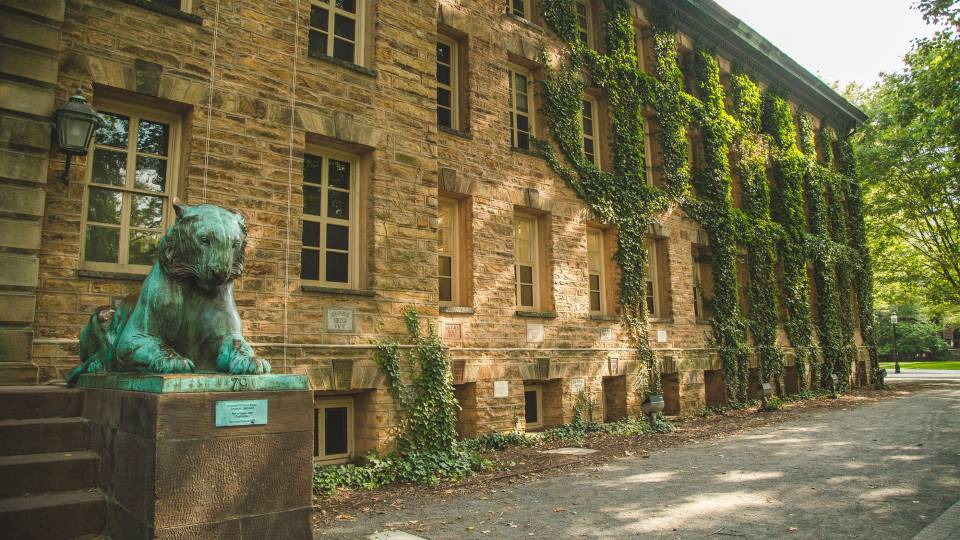The "Coming Back: Reconnecting Princeton's Black Alumni" conference held Oct. 16-18 at Princeton University featured a variety of panel discussions with Princeton faculty, alumni, graduate students and undergraduates on topics including the changing social climate on campus, the role of the Center for African American Studies and affirmative action.
The panel "The 50th Anniversary of the Civil Rights Act" centered on the question "How close are we to the dream?" and was moderated by Joshua Guild, associate professor of history and African American studies.

Alex McGill Johnson (center), a member of the Class of 1993, participates in a panel on the legacy of the Civil Rights Act at the ''Coming Back" conference. (Photos by Sameer A. Khan/Fotobuddy)
The panelists — who represented four decades of Princeton graduates, from 1966 to 1993 — traced their journeys to the University. Gerald Horne of the Class of 1970 grew up in a working-class family in St. Louis. Lawrence Hamm grew up in Newark, New Jersey.
David Evans of the Class of 1966 described growing up in rural Arkansas as one of seven children of sharecroppers. His parents had little education and both died by the time he was 17.
"From that experience we were able to extract persistence. All seven of us went to college. Three of us received advanced degrees," Evans said.
Hamm, who received a bachelor's degree in politics in 1978, acknowledged the successes of the civil rights movement and the black freedom struggle, including ending segregation and establishing the black middle class. He also detailed the continued struggles of African Americans today — right up to recent events surrounding Ferguson, Missouri.
"The civil rights movement brought us a long way but in many ways the overwhelming majority of African Americans are in worse shape today than when Dr. [Martin Luther] King was assassinated in 1968," Hamm said, citing the rise in incarceration and poverty rates for African Americans. "These are the real issues that are driving Ferguson. I thank God for the people in Ferguson."
The panel also included Warren Whitlock of the Class of 1981 and Alex McGill Johnson, a member of the Class of 1993.
In another session, a panel of undergraduate and graduate students offered a glimpse into student life at the University.
Moderator Valerie Smith, the Woodrow Wilson Professor of English and African American Studies and dean of the college, asked about the importance of mentors in the students' Princeton experience. Jessica Williams, a doctoral candidate in molecular biology, said a single mentor isn't enough.
"There are so many people who can give you so many things," she said. "Seeking out a mentor in everybody almost has been my motto in a sense. And many of them have influenced me in different areas."

A panel on the student experience at Princeton included (from left) Jessica Williams, Paul Riley, Brandon Holt, Janeria Easley and Cameron Bell. The panel was moderated by Valerie Smith (right), dean of the college.
The panel also included Cameron Bell of the Class of 2016, graduate student Janeria Easley, Brandon Holt of the Class of 2015 and Paul Riley of the Class of 2015.
The students shared anecdotes about what attracted them to Princeton, transformative experiences, experiences with white students and even the dating scene for black students.
Such opportunities to understand how the campus has — and hasn't — changed were part of what drew Elizabeth Robinson Henry, a member of the Class of 1988, to the conference.
"This is an opportunity to reunite with some people I haven't seen in a while but also to get a sense of the changes and progress Princeton has made in terms of diversity and retention of students of color," Robinson Henry said. "It's a great way to reconnect and recharge and refuel and also to see how I can contribute back as an alum even more than I do."

Paul Riley (left), a member of the Class of 2015, speaks during a panel on the student experience as Brandon Holt of the Class of 2015 looks on.
In "Science and Engineering: Research, Innovation and the Professional Landscape," four members of the faculty — whose fields include machine learning, climate science, operations research and materials science — emphasized not just progress in the laboratory but important applications in day-to-day life.
"Clearly around the globe there are problems, opportunities and challenges in front of us where science and technology can, and I would say, will have a positive impact," said moderator Wesley Harris, the first African American to receive a Ph.D. in engineering at Princeton in 1968. The panelists explored practical applications of technologies used in smart cars, health-care systems and more.
Wole Soboyejo, a professor of mechanical and aerospace engineering and the Princeton Institute for the Science and Technology of Materials, explained how technology developed in his lab has spurred a new type of solar cells that are providing electricity to villages in Africa. Recalling advice from his mother, Soboyejo said professional success isn't enough.
"Find a way of using your rich talents to bless the world," he said.
More conference highlights are available on the "Coming Back" website.






